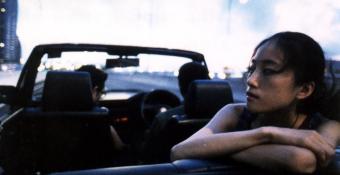 |
QU
NIAN YAN HUA TE BIE DUO Der längste Sommer The Longest Summer Fruit Chan Hongkong/China 1998 Produktion: Team Work Production House Weltvertrieb: Golden Network Ltd. Unit 4-5, 26/F, Mega Trade Center, No. 1 Mei Wan Street, Tsuen Wan, N.T., Hong Kong Tel. (852) 2751 1886, Fax 2750 4862 e-Mail: goldnet@netvigator.com Buch, Schnitt: Fruit Chan Kamera: Lam Wah Chuen Musik: Lam Wah Chuen, Kenneth Bi Ton: Wenders Li Darsteller: Tony Ho, Sam Lee, Jo Kuk Sprache: Kantonesisch Format: 35mm, 1:1.85, Farbe Länge: 132 Minuten, 24 B/sek. |
Delphi-Filmpalast Fr.12.02.1999 21.30 |
|
| Als an den Fahnenstangen statt des Union Jacks die rote Fahne der Volksrepublik China aufgezogen wird, verliert Ga Yin seine Arbeit. Nach einem komfortablen und isolierten Leben bei der britischen Armee fühlt er sich bei seiner Rückkehr in die chinesische Gesellschaft wie ein verlassenes Kind. Er muß von vorn beginnen. Ga Suen ist Ga Yins jüngerer Bruder, ein typischer Vertreter der neuen Hong-Kong-Generation, die Vitalität und Unternehmergeist verkörpert. Er will schnell zu Reichtum gelangen und kennt auch krumme Wege, um Geld zu machen. Ga Yin in seiner Zwangslage ist kein Einzelfall. Viele seiner Kollegen aus der Armee teilen sein Schicksal. Die einsetzende wirtschaftliche Depression erschwert es ihnen zusätzlich, einen einigermaßen gut bezahlten Job zu finden. In dieser Situation, in der sie ihre Ideale und jede Perspektive verloren haben, schließen sie sich der Gang von Ga Suen an. Der Anführer will aus der Kampferfahrung der Ex-Soldaten Kapital zu schlagen und bereitet einen großangelegten Bankraub vor. Danach gibt es für die Männer kein Zurück mehr aus der Welt der Kriminalität. Nicht nur die Polizei, auch eine andere Truppe aus der Unterwelt heftet sich an ihre Fersen. Sie werden zu Gefangenen gewalttätiger Verhältnisse, der sie nur mit Gewalt begegnen können. |
When the Red Flag of the People’s Republic of China replaced the Union Jack on Hong Kong’s flagpoles, Ga Yin found himself unemployed. Having lived in the comfort and isolation of the British Army, he felt like an orphan abandoned by his mother. In order to reintegrate into society, he had to start from the beginning. Ga Suen is Ga Yin’s younger brother. He is typical for the new Hong Kong generation, full of vitality and entrepreneurial spirit. Preoccupied with the idea of moneymaking, he has a multitude of ways to generate instant cash. Even though he is Ga Yin’s junior by thirteen years, he is far more familiar with the society he lives in. Ga Yin’s predicament is not unique. His ex-army-colleagues are in the same boat. They are a group forgotten by the British and Chinese, and not equipped to deal with the rapid changes in Hong Kong society. Making matters worse, the current economic depression does not make it easy for them to find a decently payed job. They constantly have to deal with pressure from their families. In a situation where they have lost their ideals, a sense of direction and clarity, they join in Ga Suen’s underworld gang. Mob boss Siu Wing wants to benefit from the combat skills of these ex-soldiers and plans a fantastic bank robbery. Thus, they move past a point of no return into the world of crime. Caught in extremely violent times they can only react with violence. When these dark times pass, this group of disbanded soldiers will experience rebirth along with the rest of post-handover Hong Kong. |
| Biofilmographie
/ Biofilmography Fruit Chan wurde am 15. April 1959 in Canton, China geboren und zog im Alter von zehn Jahren mit seiner Familie nach Hongkong. Er studierte am Hongkong Film Culture Centre, wo er nach Abschluß des Studiums Filmprogramme präsentierte und Film unterrichtete. 1982 begann er als Regieassistent bei der unabhängigen Filmproduktion und wechselte 1984 zu Golden Harvest, wo er u.a. mit Jacky Chan, Sammo Hung, Tony Au und Shu Kei arbeitete. 1991 entstand sein erster Spielfilm, Finale in Blood. 1997 drehte er seinen zweiten Film, Made in Hongkong. Fruit Chan was born on April 15th, 1959 in Canton, China. At the age of ten, he and his family moved to Hong Kong. He graduated from college in 1979 and attended a series of film courses, including film directing and script writing at the Hong Kong Film Culture Centre. From 1981-82 he worked at the Centre as Assistant Administrative Manager in charge of organizing film programs and forums, in addition to helping design and teach film courses. In 1982, Chan joined the independent film company Century Film Production and became assistant director. Two years later he entered Golden Harvest, collaborating amongst others with Jacky Chan, Sammo Hung, Tony Au and Shu Kei. In 1991 he directed his first film Finale in Blood. 1997 he made his second feature film, Made in Hong Kong, an independent production with mostly nonprofessional actors, a small team and budget. Films / Filme 1991: Finale in Blood. 1997: Made in Hong Kong. 1998: QU NIAN YAN HUA TE BIE DUO. |
|